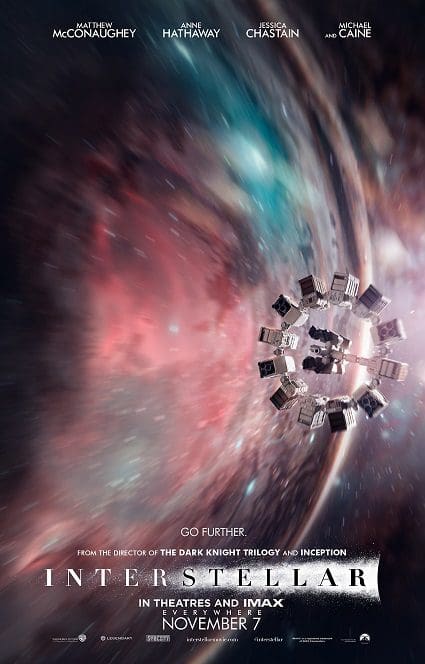
IN SHORT: The Earth’s blighted crops are dying off. Now a small group of astronauts must venture beyond our solar system in hopes of finding a new home for humanity.
WHAT IT IS: A fantastically imaginative film that explores several hard science theories while maintaining a heart wrenching father-daughter core to it. Black holes, wormholes, time dilation, and a few surprises find a home in this breathtaking film.
WHAT IT IS NOT: While Interstellar is built on a solid foundation of science, there were a few “science” moments that took me out of the movie. More nitpicks that anything else, really. Same with the human elements.
WHAT I THOUGHT: Go see this movie.
Seriously, just stop reading and go see it. It’s that good. I’m struggling to remember the last time I was this impressed with a movie. Also, it’s going to be hard for me to talk about it for fear of spoilers, but I’ll do my best.
At its core, Interstellar is about exploring the unknown set against a backdrop of desperation. Earth is dying, and people need a new home. It explores the edge of our understanding of physics, then dives off that edge. The movie takes its science seriously, and tries to be true to our current understanding of the universe. Don’t believe me? Some individual frames took 100 hours to render because they accurately modeled how light bends. Now that’s attention to detail!
The story comes with a powerful emotional core, enhanced with a healthy dose of space travel mucking up the passage of time. The tumultuous relationship between Cooper and his daughter can be heart wrenching at times. I actually got a little misty eyed over this one, and that doesn’t often happen to me at the movies.
The music deserves special note for effectively setting the mood. For example, there’s a scene around the movie’s middlish section that shows one of the Ranger space shuttles docking with the larger Endurance (the circular spaceship featured in the movie posters). All by itself, it’s a fairly standard docking sequence. Add in the music, and ohmygoshSTRESS!
And that’s another thing. This is not a relaxing movie to watch. It is STRESSFUL. The plight of humanity is communicated very effectively to the viewer. Wheat is gone. Okra is gone. Corn is basically the only crop left, and it’s starting to die. Things are GRIM, and this ratchets up the tension for all the space scenes that follow.
That being said, grounding a movie in science this firmly can be a double-edged sword. The smallest pebbles in the story can feel like boulders. For example …
START – MINOR SPOILERS
- The agricultural blight breathes nitrogen instead of oxygen. It’s implied the blight will win against oxygen breathing life forms because the Earth’s atmosphere has so much nitrogen in it. This seemed a bit silly to me, given how inert nitrogen is under normal circumstances.
- So, we’ve got this super-massive black hole called Gargantua with a bunch of planets orbiting around it. I kept wondering if the radiation from the accretion disc would make all the planets glow in the dark. Then again, given Gargantua’s size (100 million suns in mass), those planets are probably quite a distance away. Well, except for the one that’s so close its time is dilated like crazy, which brings me to my biggest complaint …
- With three planets to choose from, the crew picks the absolute worst to try first. They clearly know that one hour on the planet equals seven Earth years, and at least some of them have a strong grasp of relativity. With the first expedition leaving about ten years before them, at best they have a little over an hour of data from the planet surface (which should be clear from the quantity of data and its timestamps). Never mind the problems of colonizing such a world in the first place. Any ship you send to the surface comes back years later.
END – MINOR SPOILERS
There were also a smattering of odd moments between the characters, but these complaints really amount to nitpicks and nothing more. In the end, Interstellar delivers and then some.
So check it out if you’re looking for a story with heart where the science behind the adventure really matters. Just synchronize your watches before stepping into the theater. You know. Just in case.
VERDICT: Strongly recommended.

Leave a Reply